A lot of D&D players view their D&D world like they’re a bunch of cowards.
There are two classes in the general ouvre of D&D who spend their lives in pursuit of a goal, having committed themselves to the will of something outside of themselves to have power enough to achieve it. One of them is the Warlock, the other is the Paladin.
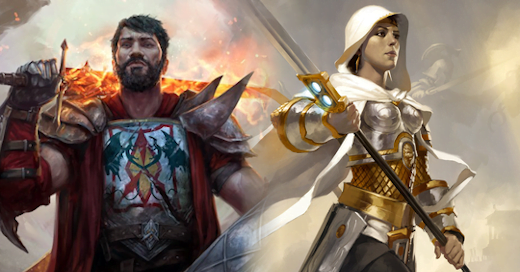
The Paladin is built out of traditional visions of a questing knight; English speakers might recognise them as sort of ‘the knights of the round table, but not the asshole ones’ They derive their name from the French word for ‘knights of the Palace,’ the Palatine. The notion was that those knights closest to Charlemagne were just the bestest dudes ever-est, and we wound up using that term to describe an idealistic, holy knight on a quest. In D&D terms, Paladins are armoured, armed, characters who, in addition to the very material advantages of has sword, have the blessing of a god or godly power that gives them magical stuff, like resistance to disease and the ability to heal.
The Warlock’s name derives from old German waerloga, meaning oath-breaker, the idea that the warlock is a sort of human who derived powerful magic from promises, promises that uuuusually had some implication of faith in God. Basically, Warlocks petition dark powers for the force of their magic. I wrote a whole thing about this some years ago (though it wasn’t good, don’t worry about it). They tend to be seen as trickster spellcasters, wily and, well, literally diabolical, with much hoo-ha about who they’re asking for power creating different kinds of flavours to their abilities.
There’s a joke about Paladins and Warlocks, that one of them has an employer and one of them has a sugar daddy, and that the difference is which one of them has a contract.
Paladins and Warlocks share something else, as well, in that they’re both classes that a whole class of Dungeonmasters seem to think of really stupidly.
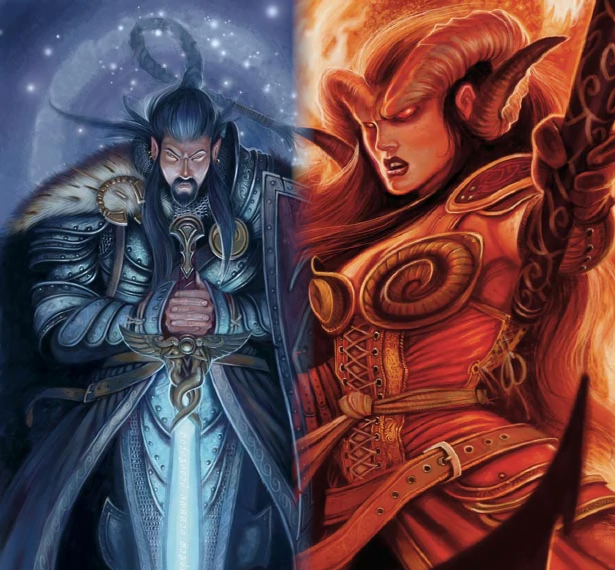
In The Design Of Everyday Things, Donald Norman expands on a pre-existing idea of affordance. Affordance is the idea that your environment offers you things. You see things around you and those things are made to offer or at least, signal what they’re offering to you (and yes, I am aware this is simplifying). A good example of this is a fidget cube.

The bits of a fidget cube are all very much designed to look like normal, sensible interface elements. There are dials which are notched so you can tell they’re meant to turn one by one. There are buttons that are all sized about a fingertip size. The joystick section has a depression in it about the size of a fingertip, and that complies with the range of motion of the joystick. Everything here is designed to be interacted with, and when you interact with it, it gives you meaningful feedback that it did the thing it’s supposed to do.
This is an example of affordance; the fidget cube is showing you the things it’s for just by how it’s designed, and you can tell looking at it. This is what this is meant to do.
There’s a problem with TTRPG design where the information we present to players creates unintentional affordance. We’re going to look at that in light of specifically Dungeons and Dragons.
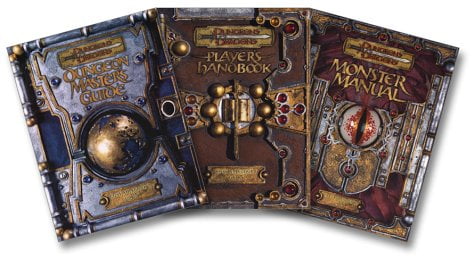
Now, for this bit of historical conversation, I’m going to be discussing the interface presented in the 3.5 D&D books. This is because it’s available on the D20Srd, 4e avoids this problem, and I have no interest in becoming an expert in 5th edition. These rules are twenty years old: The mindsets that permete these books have been the foundation of our now.
D&D presents its core rules in three books (because they can afford to). One of these books is the Monster Manual, a manual full of monsters. One of these books is the Dungeon Master’s Guide, which is for specialised information for running the game, and one of them is the Player’s Handbook, which, and I know this seems pretty ridiculous to state because it’s on the cover, is for players. Now some might see it as inappropriate to divide the systems in the game like that, and how the dungeon master is a player as well as the rest of them, but whatever. The important thing is that the Player’s Handbook is a set of rules for players to engage with, and it’s presented as the stuff they should know.
That player’s handbook is where you find the rules for races and classes, rules for feats and powers and skills and spells, all that good stuff that players love to have and use and that make up the bulk of how you interact with the game and the game’s world. In the player’s handbook, it presents the Paladin. The Warlock comes along later, in the Complete Arcane, don’t worry, we’ll get to them. They’re also classes, they’re squarely in the realm of what the game tells you players care about.
This constructs a language that things relating to the player are the things presented as player options; what is shown as a feat, prestige class, spell or skill is something players get to have access to. When you see those things in other books, even books that are ostensibly for the DM, they’re still ‘player’ options, and therefore, you know how to engage with them. That’s where the next stage of affordance comes up.
In the spell list of 3.5, there was this one spell, lurking around like a mind virus waiting to infest: Atonement. It’s there. It’s a player option, right? Like all the other spells players can use.
Now, this spell is not meant to be a player power not really. The spell is a fix. It’s there because the Paladin is meant to have a code of conduct (presented in the Paladin’s class section), and the game designers felt they needed some way to say ‘players can fix that.’ It’s an understandable need: you have the code of conduct, you need a rule for violating it, and then you need some way to fix that so players aren’t left with a defunct character. This is part of the problem of treating character building like it’s constructing a game piece, and then requiring advancement to take literal months of play time.
Atonement however, has a bunch of the rules about how falling works, and that means it covers such details as:
- You can ‘fall’ as a Paladin even if you didn’t know what you were doing was wrong
- A deity is required to atone a character’s situation, but it doesn’t have to be the Paladin’s deity
- You can ‘fall’ as a Paladin even if you were mind controlled into doing it
- Paladins can’t atone for themselves; they have to get it cast for them by a cleric or druid
- The caster has to pay a cost to cast this spell
Now, this is all the stuff in Atonement. That’s in the spell that fixes the code of conduct violants. But in the text of the Paladin, for the rules and standards they must maintain, we get the much smaller:
Code of Conduct
A paladin must be of lawful good alignment and loses all class abilities if she ever willingly commits an evil act.
Additionally, a paladin’s code requires that she respect legitimate authority, act with honor (not lying, not cheating, not using poison, and so forth), help those in need (provided they do not use the help for evil or chaotic ends), and punish those who harm or threaten innocents.
The code of conduct is pretty vague, and I can see why you’d do it that way. This is functionally a roleplay guideline, something so that Paladins will behave differently to fighters, for example. Now, I think there’s a lot of better ways to do that (and 4e did, he huffs), but the basic idea is there. You aren’t setting this up as a list of ways to make Paladins’ lives suck, you’re setting it up to be a way to penalise Paladins for not sticking to the point of Paladins. So far so good.
Now we’re at this point of affordance.
The game has in it this big button marked atonement. It has a standardised, systemic fix for falling paladins. Now, I played a lot of 3rd edition D&D – something like seven years of it – and during that entire time, not once did we need that atonement spell. Paladins were played by people who wanted to play paladins, and weren’t looking for the DM to kick their teeth in over the Gamer Crime of ‘being a goodie.’ Still it seems a generation of gamers and DMs looked at this atonement spell, and seemingly assumed it was a natural end point of the life of a Paladin. Any story of the Paladin would need the moral complexity, nay, the failure of that Paladin.
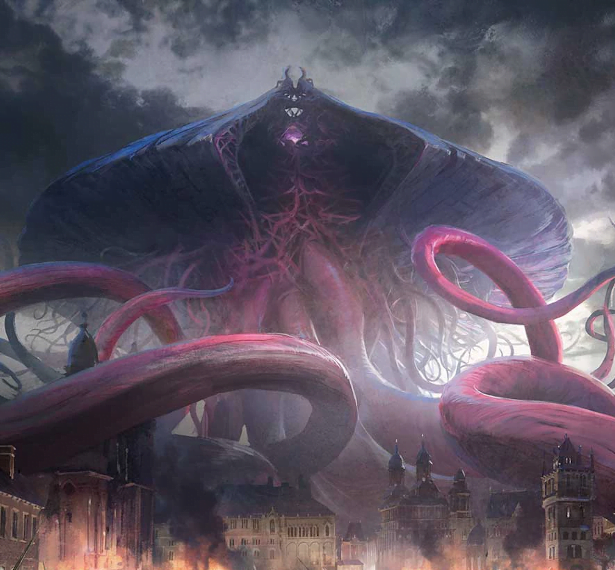
Then we have the Warlock. Introduced in 3.5 D&D’s book The Complete Arcane, the Warlock became a fan favourite despite the fact it was not very good. Bonus, their low power level was a great indicator of the kind of GM you were dealing with. Because the Warlock did ‘spell stuff’ all the time, instead of on a limited drip, there were players and DMs who were convinced the Warlock was overpowered, despite being worse than a fighter with a bow. Warlocks made nonspecific pacts with evil powers and were granted boons because of it with names like ‘Diabolic Majesty,’ which were extremely sick and also garbage that a magic item could replace.
You could make a warlock do broken stuff but only by buying a bunch of wizard’s wands.
The Warlock in 3.5 had a rough start, but then in 4th edition, it got graduated up to the core set, in part I think because there was a nice, obvious design space for them alongside the wizard. Wizards did spells that messed with people, controlled space and time and minds, but warlocks shot holes in your soul. Warlocks further differentiated themselves with the idea of pacts, where you could pick a different flavour of horrible spookiness to throw your soul to in order to gain power. There were star pacts, far realm pacts, fey pacts, demonic pacts, pacts with the dead sorcerer kings, and they were all great.
Well, when 5th edition came around and…
sigh.
Look, I make a point that I don’t like or play 5th edition, right? I don’t care about this system. I don’t want to care about this system. It’s extremely tiring to me to see a really good system displaced by a system that shares the same two lies about 4th edition. But, with 5th edition, we have more Warlocks, and the pacts and patronage are still there.
It’s been six years. 5th edition is here. I’m allowed to have picked stuff up without being able to chapter-and-verse you on this one.
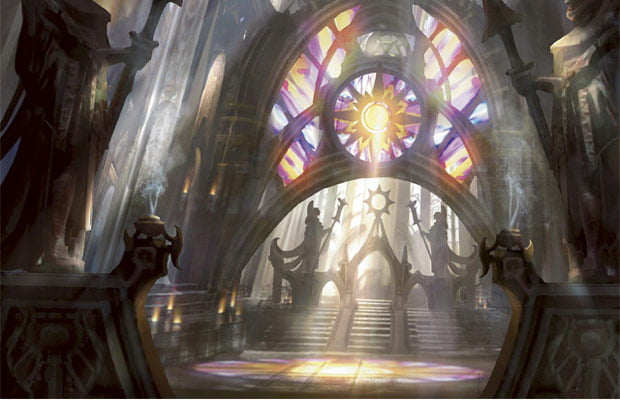
Around this time last year, a conversation in the dungeons and discourse came up and reared its ugly head as a bunch of long-time, public figures who were involved in the hobby and guided less experienced players, started to talk about their mechanics for handling Warlocks, and as a direct consequence, the conversation turned to Paladins.
There is some toxic-ass posturing going on in this community, let me tell you. The community leaders and voices that want to talk about how to teach people how to play D&D right now? The sponsored shows and the streamers and the people with fanbases? They have some toxic-ass ideas about what makes for a good game, and it all came out in these spiralling, noisy threads of self-important, punitive piss.
The Paladin, it seems, is a class you’re always trying to dupe into making moral choices that punish them. Players are assumed they will give up loot opportunities, or be forced to work alongside villains or suffer the presence of awful people, because the DM is constantly playing a kind of shell game with them as if we’re all not very over Bioshock Infinite style ‘ahah, but these people are bad too!’ nonsense. Warlocks, the suggestion went, should have an invisibly increasing meter that resulted in the patron just eventually deciding they’d had enough and given enough and it was time now to drag the Warlock to hell, and that’s that.
And not only did people laud this, but other voices in the community of public DMs lauded this.
This is ridiculous and it’s disgusting. There are two classes here that are unified mostly in that they have an ideology underpinning their mechanics, and these people spoke about them as if these two classes deserved to be singled out to have their players lose what they worked on – what they cared about! – because they made the mistake, without ever being told about it, to play these character classes.
This is terrible game design. Not the base game itself – not D&D. The GMs are running a game – and the game they’re running is a game they made design decisions over. The design decision that ‘sometimes, Paladins are just screwed’ is a bad design decision.
My opinion of this is it’s an issue of affordance. These DMs see that there’s a button you can push to un-break these classes, so they got it internalised in their head that the natural existence of these characters is to wait to be broken. This is an issue of game interface. Falling, rising, ideals and what they empower you to do, are broken down into game mechanics, suggesting an idea that this is just another lever or switch you can flip or turn, that an immense ideological collapse and destruction of your personal faith is just a fun game mechanic to throw at people like they’re god damn flumphs.
But there’s more to it than that. There’s the true foulness at the heart of it.
I think to an extent part of this is about engaging with the game in a way that your story is about generating drama and encouraging engagement more than it is about actually telling a coherent story with a specific theme or an ideology. In that case, you’re going to make a story that isn’t really about anything as much as it is taking the story elements presented to you and making them make the maximum of noise for the minimum of movement. Time to put the thumbscrews to the Paladin and time to doom the Warlock. Roll up another character, Karen, you made a mistake six months ago and you should know better.
In the end, the Paladin and the Warlock are characters united in that they are characters whose ideology drives how they treat the world. Warlocks willingly surrender something of themselves for power. Paladins willingly subject themselves to a code of conduct in the name of achieving greater ends.
When you take that kind of character, and see their failure as inherent and inevitable, you are telling me something about who you are, and what you believe in. It says that anyone who cares enough to try and make things better should watch their mouth. It says that using something dangerous to any good ends is itself dangerous and should be punished. It says to me that you’re the kind of person who sees a status quo of suffering as acceptable, because changing it would involve making a fuss.
I love Warlocks and Paladins.
And I hate this punitive, cowardly, centrist pissantry.
This article was reposted from Talen’s personal blog.
You can find the original at Press.exe

1 Comment
Wow, I missed all that drama, fortunately, but I think I have caught whiffs of it. It’s not all that new, I don’t think. Not really. But it sounds like it has metastasized.
Punishing paladins might have made sense at one time. I think that there was a time when they were pretty powerful, or were at least meant to be, given that one had to luck out on ability scores and then jump through multiclassing hoops. I don’t recall any stories of someone becoming a paladin and then just being unstoppable, but in the right game – say one where the DM was throwing fear effects and disease at people, and smashing the lower-HP, more lightly armored, less-well-armed cleric flat – someone immune to the DM’s worst threats and also a metal-clad juggernaut that could not only zero in on evil, but then burn it down, might seem like someone the world would want to take down a peg. That character /should/ have to struggle to keep their power, because the world wants to make them /stop/.
(One source for the paladin was Three Hearts and Three Lions. If I recall correctly, the holy warrior in that story was able to protect his allies from Morgan le Fay simply by how lawful he is. Then, he (almost completely by accident, and partly from a trick by le Fay) falls from grace, and the power is stripped away, leading to a useful crisis in the story.)
Of course, once the paladin is presented as (ostensibly) just as powerful (hahasnort) as all the other classes, and no harder for a player to become, any reason for the paladin to fall is gone, in my view. Yes, the world can probably trick the paladin into losing its powers. They might even be able to get a bard, barbarian or monk to stop advancing. But meanwhile the cleric and the wizard are utterly unaffected. (I guess there are ways that they’re supposed to be vulnerable too, but the books don’t really offer too much about that, and a ton of ways to avoid it).
I haven’t heard much about the warlock/patron shenanigans though I can well imagine.